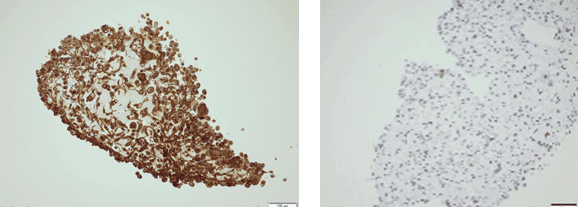Soft tissue sarcoma (synovial sarcoma) organoids from patient samples and patient-derived xenografts

Tumor

Principal Investigator
- Prof. Dr. Patrick Schöffski
- Department of Oncology – laboratory of experimental oncology.
- Campus Gasthuisberg – O&N4 – 7th floor (room 07.111)
- Herestraat 49
- 3000 Leuven
- https://gbiomed.kuleuven.be/english/research
Short CV
Prof. Dr. Patrick Schöffski is head of the laboratory of experimental oncology and head of the department of medical oncology at UZ Leuven. His research is focusing on soft tissue sarcoma, which is a group of rare malignancies, originating from mesenchymal cells. These tumours are highly heterogenous in terms of histopathological background and molecular features. His lab has ample experience in studying the efficacy of novel agents in soft tissue sarcoma in vivo, using a panel of patient-derived xenografts.
The lab has recently started to develop three-dimensional cell culture models from soft tissue sarcoma with the ultimate goal to use these models for drug testing before investigating novel compounds in mouse models.
3D tissue models
The use of three-dimensional cell culture models is considered a reliable model that is successfully used for high-throughput drug testing in carcinoma research. However, the development of soft tissue sarcoma organoids is lagging behind. Patrick Schöffski’s laboratory is developing three-dimensional models of synovial sarcoma, which is one of the more common subtypes of soft tissue sarcoma. These models are created from patient samples or patient-derived xenografts.
Fresh tumor tissue is collected and enzymatically and mechanically dissociated into small cell clusters. The cells are seeded into a three-dimensional scaffold consisting of collagen type 1 and Matrigel. Advanced Dulbecco's modified Eagle’s medium (DMEM)/F12 and different growth factors (like human recombinant epidermal growth factor, human insulin-like growth factor 1, human recombinant fibroblast growth factor 2 and N-acetylcysteine) are added. The Rho-kinase inhibitor Y-27632 is added to prevent apoptosis during early passages. Subsequently, organoids are enzymatically (using Liberase) and mechanically passaged every 7-14 days. Established cultures can be amplified, cryopreserved for biobanking or used for drug screening experiments.
It seems the specific growth conditions for soft tissue sarcoma organoids are subtype specific. In the future, organoids from other subtypes of soft tissue sarcoma will be developed as well.
Application
- Unraveling the biology of soft tissue sarcoma
- Biobanking
- Drug discovery and screening
Illustrations


Collaboration opportunities
- Soft tissue sarcoma samples from patient-derived xenografts and patient samples.
- Expertise with three-dimensional cultures derived from synovial sarcoma tumour samples.
Contact person:
- Prof. Dr. Patrick Schöffski
- Prof. Dr. Agnieszka Wozniak, research manager, laboratory of experimental oncology
- Lore De Cock, PhD student, laboratory of experimental oncology

